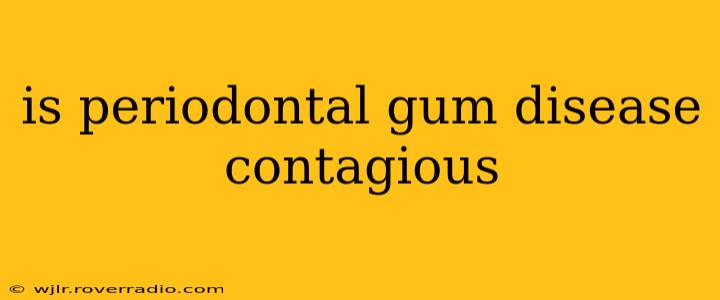Periodontal disease, also known as gum disease, is a prevalent oral health issue affecting millions worldwide. While not directly contagious in the same way as, say, the flu, the bacteria that cause it can be transferred between individuals, making it a complex issue regarding contagion. This article will delve into the nuances of periodontal disease transmission and explore common questions surrounding its spread.
Can Gum Disease Be Passed From Person to Person?
While periodontal disease itself isn't directly contagious like a virus, the bacteria responsible for its development can be transmitted. These bacteria, primarily Porphyromonas gingivalis and Aggregatibacter actinomycetemcomitans, are found in the mouth and can be spread through saliva. This transmission is often facilitated by close contact, such as kissing or sharing utensils. However, it’s crucial to understand that simply sharing utensils doesn't automatically guarantee the development of gum disease. A person's overall oral hygiene, immune system strength, and genetic predisposition all play significant roles in whether or not they develop the disease.
What Factors Increase the Risk of Transmitting Gum Disease Bacteria?
Several factors can increase the likelihood of transferring the bacteria associated with periodontal disease:
- Close contact: Sharing utensils, toothbrushes, or engaging in activities involving saliva exchange (e.g., kissing) increases the risk of transmission.
- Compromised immune system: Individuals with weakened immune systems are more vulnerable to bacterial infections, including those that contribute to periodontal disease.
- Poor oral hygiene: Individuals with poor oral hygiene are more likely to harbor high levels of periodontal bacteria, increasing the risk of transmission.
- Genetic predisposition: Some individuals are genetically predisposed to developing periodontal disease, even with good oral hygiene. This doesn't mean it's directly contagious from a genetic standpoint, but genetic factors influence susceptibility to the bacteria.
Is it Possible to Catch Gum Disease From a Family Member?
Yes, it's possible, though not guaranteed. Living in close proximity to someone with periodontal disease, especially with shared utensils or other close-contact situations, slightly increases the risk of exposure to the bacteria. However, the development of the disease still depends on individual factors mentioned earlier. Children living with parents who have gum disease may face a slightly higher risk. Regular dental check-ups and excellent oral hygiene practices are crucial for minimizing this risk.
How Can I Protect Myself From Getting Gum Disease?
The best way to prevent periodontal disease is through proactive oral hygiene:
- Brush and floss regularly: This helps remove plaque and bacteria build-up, preventing the progression of gum disease.
- Regular dental check-ups: Professional cleanings remove plaque and tartar that you can't remove at home. Regular check-ups allow for early detection and treatment of gum disease.
- Maintain a healthy diet: A balanced diet supports a strong immune system, increasing your body's ability to fight off infection.
- Avoid smoking: Smoking significantly increases the risk of gum disease and slows healing.
Can a pregnant woman pass gum disease to her baby?
While a pregnant woman cannot directly pass periodontal disease to her baby, there is some evidence suggesting a link between maternal periodontal disease and preterm birth or low birth weight. The mechanisms are not fully understood, but it is believed that inflammatory responses associated with gum disease may influence pregnancy outcomes. Therefore, maintaining optimal oral health during pregnancy is highly recommended.
In conclusion, while the bacteria causing periodontal disease can be transmitted, it's not a directly contagious disease in the same way as a viral infection. Personal hygiene, immune system strength, and genetic factors all contribute to an individual's susceptibility. Practicing good oral hygiene and regular dental check-ups are crucial preventive measures.
